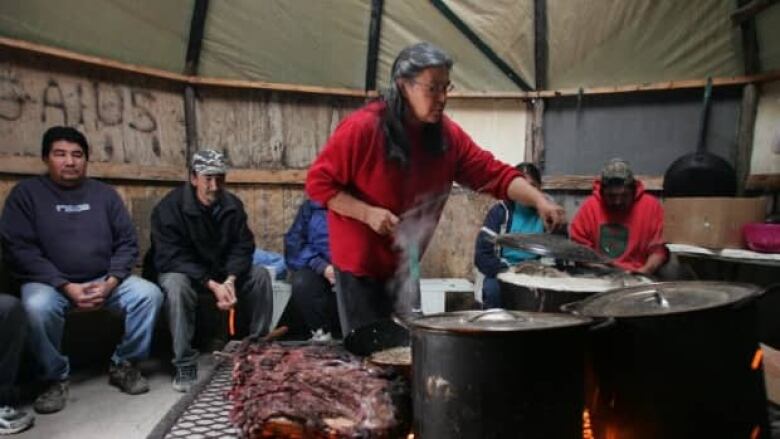Bill coming to improve First Nations water quality
Liberal Opposition day motion calls on government to ensure clean, running water on reserves

The federal government announced new money to address drinking water quality on northern Manitoba reserves Thursday, as it said it would support a Liberal motion to ensure all First Nations reserves have clean, running drinking water.
Aboriginal Affairs Minister JohnDuncan announced $5.5 million Thursday to help improve infrastructure in Manitoba'sIsland Lake First Nations communities, which have faced severewater-quality issues. Duncan said his officials would be meeting with the leaders of those communities Friday.
The opposition day motion, moved by interim Liberal Leader Bob Rae, asks for the need for safe drinking water to be addressed "on an urgent basis""no later than the spring of 2012."
Kicking off debate in the House of Commons Thursday morning, Rae called the lack of access to something as "basic and fundamental" assafe drinking water "the most telling symbol of the hardship" hundreds of impoverished First Nations communities face.
Duncan said his government was prepared to support the Liberal motion.
"We all are in agreement that the current standards are unacceptable," Duncan told the House of Commons.
Earlier in the week,Duncan said his government would act soon to address thewater quality problems on reserves.
"We will be introducing legislation on water so we can have enforceable standards, and we will develop regulations with our First Nations partners," Duncan said Wednesday during question period.
Infrastructure funds needed
Rae spoke of his experience as the premier of Ontario two decades ago, and the efforts he made then to work across jurisdictions to negotiate federal-provincial cost-sharing agreements to fund the kind of water and sewerinfrastructure improvements needed to fix this problem.
Rae said he had spoken to Manitoba Premier Gary Selinger, who said the province was prepared to negotiate a similar agreement with Ottawa to address the Island Lake communities. Duncan made his announcement of $5.5 million at the end of question period.
"It would be nice if we didn't have to debate this issue," Rae said. Noting Canada's relative wealth in other ways, Rae asked "this is the country that can't provide the basics of life?"
But Rae said changing regulations isn't enough. He saidthe government also needs to provide the financial resources First Nations communities need to improve their water systems.
Rae saidthe government's own expert panel recommended to former Indian affairs minister Jim Prentice in 2006 that the federal government deal with the resources first, then deal with the regulations.
The government says it hasspent $2.5 billion dollars over six years to improve water on reserves.
A Senate bill to improve water quality standards on reserves died on the order paper when last spring's election was called. It's unclear whether the new bill promised by Duncan will mirror that bill.
Aboriginal leaders were critical of the previous bill, saying all it did was impose standards without any resources to help meet them.
Staffing problems and aging infrastructure have led to an increase noted by the federal governmentin the number of water systems deemed high risk.
Rampant concerns
More than 150 First Nations reserves across Canadaareunder drinking-water advisories.
To cite one example, theFort McKay First Nationin Alberta has been relying on bottled water due to fears that the community's municipal-supplied water may be tainted by high levels of cancer-causing chemical compounds.
NDP MP Charlie Angus spoke passionatelyin Thursday's debate about the drinking water problems on First Nations communities in his northern Ontario riding, a desperate cause he's championed for years.
He called the Kashechewan reserve "the epicentre of Canada's state of emergency" over First Nations drinking water.
He also noted reports of children in immediate risk because of the water and sanitation problems on the Attawapiskat reserve.
"Citizens are being denied their basic rights," Angus said.
Liberal Aboriginal Affairs critic Carolyn Bennett noted that areport by a Senate committeechaired by Conservative Senator Gerry St. Germain said that regulations like the government's proposed bill was only part of the answer, and "sustained investment is absolutely essential."
Bennett said introducing the legislation alone risksplacing an addition burden on reserves withoutfixing anything.
"It's a health issue and a human rights issue," Bennett said.
Failing grade
On Tuesday, environmental organization Ecojustice gave the federal government an 'F' grade in its government report card on drinking water, emphasizing its failure to protect First Nations communities.
Ecojustice warned that lessons learned from water management failures in the town of Walkerton, Ont. have not been applied. Provincial water quality standards found to be otherwise good stop at the boundaries of First Nations reserves.
Before she left office earlier this year, former auditor generalSheila Fraserreiterateda message documented over numerous reports from her officethatconditions on First Nations reserves are "unacceptable."
with files from Karina Roman












_(720p).jpg)


 OFFICIAL HD MUSIC VIDEO.jpg)
.jpg)



























































































